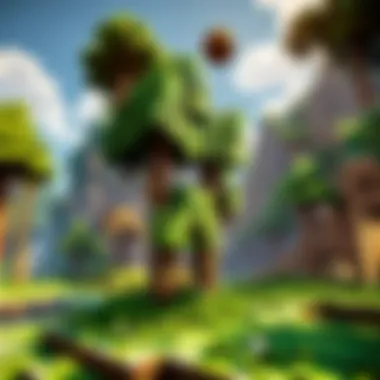Mastering Minecraft Points: An Essential Guide


Intro
Minecraft has evolved since its launch in 2011, transforming from a simple sandbox game into a complex platform with intricate mechanics. One of these mechanics revolves around the concept of points. Understanding Minecraft points is vital for both new and experienced players who wish to enhance their gameplay experience and maximize their in-game accomplishments. This comprehensive guide will provide clarity about the significance of points, how they function within the game, and effective strategies to earn and utilize them.
This guide covers several key areas, including gameplay mechanics related to points, the differences between point types, and how various updates impact point systems. Additionally, we will explore community strategies that contribute to successful point accumulation. By the end, readers will have a solid understanding of how to navigate the point system in Minecraft, ultimately enriching their gaming journey.
Preface to Minecraft Points
In the vast world of Minecraft, points hold significant weight in the gaming experience. Understanding points in Minecraft opens up the door to more strategic gameplay. This section introduces the concept of points, emphasizing their role and value in the game. Players, whether novice or veteran, can benefit from comprehensively grasping how points operate.
Defining Points in Minecraft
Points in Minecraft represent various forms of achievements and progress. These points can manifest in different capacities, including experience, scores, and achievements. Each type of point contributes uniquely to the overall gameplay experience. Experience points, for instance, are essential for leveling up and gaining new abilities. Score points track player success, while achievement points recognize milestones in gameplay.
The Role of Points in Gameplay
Points serve as the backbone of many in-game mechanics. They encourage players to pursue specific goals, making the quests more engaging. For example, accumulating experience points can lead to acquiring enchantments, which are crucial for a player's survival. Additionally, points can influence interactions in multiplayer settings, as they often determine competitive edges and access to certain features. Thus, understanding how to earn and utilize points becomes a key aspect of mastering Minecraft.
Purpose of Points for Players
The purpose of points in Minecraft extends beyond mere accumulation. These points allow players to track their progress and set personal goals. By earning points, players unlock new opportunities and enhance their overall experience. Points can drive motivation, pushing players to explore new aspects of the game. Whether it is through crafting, building, or battling, points provide a tangible way to measure growth and achievement within the Minecraft universe.
Types of Minecraft Points
The concept of points in Minecraft is multifaceted, impacting how players interact with the game. Understanding the different types of points is essential for anyone looking to optimize their gameplay experience. Each type serves a distinct purpose, influencing player strategies, enjoyment, and overall engagement. A clear grasp of these points can provide deeper insight into how to reach new levels in the game. Below, we delve into the main categories: Experience Points, Score Points, Achievement Points, and the relationship between Rewards and Points.
Experience Points
Experience Points (XP) are a core element in Minecraft. They serve as the primary currency for enchanting items, repairing gear, and enhancing abilities. Players earn XP through various activities, such as defeating mobs, mining ores, and trading with villagers. The amount of XP gained varies depending on the action. For instance, killing a zombie grants fewer points than mining rare materials.
XP is crucial for player advancement. As you collect more XP, you reach higher levels, which unlock new possibilities, particularly in enchanting. Enchanting allows players to imbue their gear with special powers. This feature can dramatically change gameplay, making it important to prioritize XP farming.
Score Points
Score Points, on the other hand, track achievements and in-game milestones. They do not directly affect gameplay mechanics but serve more as a measure of progress and skill. Scoring can occur through various activities, such as completing objectives or exploring. Different game modes may have specific scoring rules. For example, in minigames, your score can determine your rank compared to other players.
Unlike Experience Points, Score Points are not tied to character progression or item enhancement. They can be a source of personal satisfaction for some players, but not all see them as integral to their gaming experience. If competitive play is your focus, monitoring Score Points might be beneficial when challenging your skills.
Achievement Points
Achievement Points classify the various milestones reached during gameplay. Each achievement corresponds to specific challenges or tasks. Successfully completing these activities grants players achievement points. Their function is twofold: they reward players for exploration and enhancing the overall gaming experience.


The achievements can vary significantly, from simple tasks like gathering specific items to complex challenges requiring advanced skills. This type of point may appeal particularly to players who enjoy completionism. By tracking progress through achievements, players receive recognition for their efforts and gain motivation to tackle more difficult tasks.
Rewards vs Points
In Minecraft, there is often confusion regarding the distinction between rewards and points. Rewards are tangible items or benefits received upon completing tasks, while points serve as a more abstract representation of a player's skill and achievements. Understanding this difference is crucial for planning gameplay strategies.
For instance, players might focus on earning XP to enchant weapons but simultaneously accumulate Score and Achievement Points for personal satisfaction and bragging rights.
Ultimately, these different types of points cater to diverse playstyles. Whether you play for progression, achievement, or the sheer enjoyment of the game, recognizing these categories will enhance your Minecraft journey.
Earning Points in Minecraft
Earning points in Minecraft is the cornerstone of gameplay progression. Points serve multiple functions that enhance player experience. They allow for not just improvement of skills but also awards and upgrades that can greatly influence how players navigate the game. There are specific ways to gather points, ranging from the simplest tasks to more complex strategies. Understanding these methods is critical to maximizing your point accumulation and overall enjoyment of the game.
Basic Methods of Earning Points
In Minecraft, points can generally be earned through several fundamental activities. These activities can be particularly effective, especially for new players. The basic methods include:
- Mining Resources: Every block mined contributes towards experience points. Identifying valuable resources like diamond ore or emerald ore can yield greater points.
- Defeating Mobs: Enemies in the game like zombies or skeletons drop experience points when defeated. Targeting hostile mobs can be an efficient way to accumulate points.
- Completing Achievements: Each achievement unlocked results in additional points. Familiarizing yourself with the various achievement objectives within the game can enhance your earning.
- Crafting Items: Crafting may seem mundane, but various crafted items come with experience points. Experimenting with different recipes is valuable.
Advanced Strategies for Point Accumulation
Once players grasp the basics, they can implement more advanced strategies to optimize point earning. These strategies often involve combining different actions to create more opportunity for points. Here are some strategies:
- Efficient Farming: Setting up automatic farms can ensure a constant supply of resources and mobs for points without continuous effort. This can include crop farms or mob farms.
- Utilizing Enchantments: Enchanting tools can expedite resource gathering. For example, using a fortune-enchanted pickaxe can yield more diamonds, consequently increasing your points.
- Engaging in Minigames: Joining community-driven servers often offer minigames or challenges where points can be earned in bulk. These events frequently reward participation with experience points.
- Participating in Multiplayer: Teaming up with experienced friends allows for tackling larger challenges. Working together can create a point economy where mining and mob-fighting yield higher rewards.
The Impact of Player Actions on Points
Player actions have a substantial effect on points, determining how effectively they can be earned. Different strategies can lead to variable amounts of points accrued. For instance:
- Risk vs Reward: Taking on more formidable mobs or exploring dangerous environments can yield greater points, but players should weigh risks carefully. It may lead to loss of resources if not careful.
- Exploration: Discovering new biomes or structures can lead to new resources, potential mob encounters, and thus points. Players who explore significantly increase their point potential.
- Group Dynamics: In multiplayer scenarios, working cooperatively can amplify point acquisition. Sharing tasks or roles can help in defeating mobs more efficiently.
"Earning points is not just about the numbers; it's about expanding your capabilities within the game."
By understanding and applying these concepts, players can significantly expedite their point accumulation process. This foundational knowledge paves the way for deeper engagement with Minecraft’s various gameplay elements.
Managing Points in Gameplay
Managing points in Minecraft is crucial for maximizing your gameplay experience. Points serve various functions, ranging from enhancing your character to trading for vital resources. Understanding how to manipulate these points effectively allows players to gain more advantages in their adventures. In this section, we will explore three main aspects of managing points: conversion mechanics, utilizing points for upgrades, and trading points for resources. Each aspect plays a significant role in improving a player's efficiency and strategies within the game.
Point Conversion Mechanics
The mechanics of point conversion are fundamental to how players can utilize points in Minecraft. This system allows players to convert one type of point into another, but it requires a clear understanding of how these transactions work. For instance, experience points can sometimes be converted into score points through specific gameplay actions or environments.


Details on point conversion are essential because they provide flexibility in how players approach challenges. It is essential to track your points consistently and understand which actions yield the best conversions. Managing these interactions helps players optimize their overall point portfolio and remain competitive within the game.
Utilizing Points for Upgrades
Points are incredibly valuable for upgrading character abilities and tools. Players can often spend their accumulated points to enhance their gear or unlock skills tailored to their gameplay style. Understanding precisely what upgrades are available and how many points each requires is crucial to effective gameplay.
Some reliable upgrades that players might consider include:
- Tool enhancements: Upgrade your pickaxe or sword to increase durability and effectiveness.
- Armor improvements: Stronger armor decreases damage taken.
- Skill enhancements: Augment abilities like speed or strength.
Prioritizing which upgrades to pursue can impact your efficiency when facing Minecraft's challenges.
Trading Points for Resources
Trading points for valuable in-game resources opens up new strategies for players. Rather than relying solely on exploration and crafting, players can consciously trade their points to acquire tools, food, and other items that aid in survival.
Key points to consider about trading include:
- Resource availability: Some resources may only be available through points.
- Value assessment: Ensure the value of what you are trading is worth it. Not all trades will be beneficial.
- Market observation: Track what resources are in demand and adjust your trades accordingly.
Trading your points wisely allows you to adapt to the game’s economic systems and prepare for future encounters.
Managing points efficiently creates a deeper gameplay experience. Players who grasp the point dynamics unlock new strategies and enhance their adventures.
By focusing on point conversion mechanics, utilizing points for essential upgrades, and trading them effectively, players significantly elevate their overall experience in Minecraft. Mastery of these techniques contributes to rich and diverse gameplay, providing many opportunities for creativity and strategy.
Points and Community Engagement
In the landscape of Minecraft, community engagement plays a crucial role in enhancing the overall experience for players. Points in Minecraft serve not just as a measure of individual achievement, but also as a medium for interaction among players. Understanding this integration is essential to appreciate how points shape community dynamics and foster collaboration.
Integration of Points in Multiplayer
In multiplayer environments, points create a competitive yet cooperative atmosphere. Players can compete for points while working together on community projects or during events. This dual function creates a layer of engagement that makes multiplayer gaming more rewarding.
In many servers, points often reflect a player’s contributions to the community. For instance, players earn points for building structures, participating in events, or helping others. Leaders can establish point systems to dictate rewards or privileges to players based on their contributions. This incentive structure encourages players to become active members of their communities. Through these systems, players are more likely to form alliances, fostering a sense of belonging and collaboration.
Community Challenges and Points
Minecraft also sees the rise of community challenges, where players can participate in events geared towards achieving specific goals. These challenges typically revolve around harvesting resources, building projects, or defeating bosses. As players contribute, they earn points that track their progress, enhancing motivation.
Often, these events are not just about individual achievements; they are about collective goals. Tracking points in this manner allows for celebration of communal milestones. Players can view leaderboards, showcasing their positions relative to other participants. Such visibility not only promotes friendly competition but also strengthens bonds between players as they celebrate each other's progress.


Community challenges often lead to shared experiences that, in turn, foster friendships and teamwork.
Comparing Points Across Players
The examination of points across different players serves as an intriguing aspect of community engagement. By comparing point totals, players can gauge their progress in relation to others, which facilitates healthy competition. This comparison can be motivating for some and serves as a way to create informal rivalries or friendships.
Different servers may implement unique ways to compare points, changing how players view their achievements. Whether through leaderboards, public notifications, or social media platforms like Reddit, players remain aware of their standing. In scenarios where players interact through forums or social media, point discussions can arise, enhancing community ties.
Ultimately, the way points function allows for communication and camaraderie among players. This aspect of Minecraft points significantly enhances the gaming experience, transforming a solitary adventure into a shared journey. Thus, players who engage actively with the point systems and their communities often find themselves richer in both achievement and social connections.
Points in the Context of Game Updates
In the evolving universe of Minecraft, points play a crucial role. They not only enhance player interactions but also contribute to the game's dynamic environment. Updates often reframe how points function, affecting both their accumulation and usage.
History of Points Changes
Historically, the point system in Minecraft has been a subject of modification. Early versions had basic functionalities, where experience points were primarily tied to mining and creature defeat. With updates, Mojang adopted a more sophisticated approach. For instance, the introduction of Minecraft 1.16 saw players gaining experience through new sources like piglins and netherite items, making the experience points more diversified.
This evolution also reflects changes in player behavior. As players explored and experimented, they sought more avenues for earning points. Mojang responded by adding more game mechanics that allowed points to be earned in varied contexts. It's clear that points have transitioned from a simple reward system to a multifaceted mechanic that shapes gameplay experiences.
Recent Updates Affecting Points
Recent updates continue to impact how points function within Minecraft. The Caves and Cliffs update is a noteworthy example. It introduced new biomes, mobs, and items, thus altering the landscape of point acquisition. Players could explore deeper caves and discover unique resources, leading to greater opportunities for point accumulation.
Moreover, the Minecraft 1.18 update introduced enhanced mechanics that reward players for exploration and discovery. Players now receive points not just for defeating enemies but also for engaging with the environment in novel ways. This keeps gameplay fresh and offers various strategies for accumulating points.
Future Developments on Point Systems
Looking forward, the potential for further developments in the point system remains vast. As players demand more complex gameplay experiences, Mojang is likely to adapt. Future updates could feature new points categories, such as points for achievements related to building or community projects. Integrating points with community events may also enhance multiplayer dynamics, giving players more reasons to collaborate.
Another possibility is the refinement of point conversion mechanics. Currently, players can convert experience points to enchantments. Future updates might expand this, allowing points to be traded more strategically.
Finale: The Importance of Points in Minecraft
Points serve a critical role in enhancing the Minecraft experience, providing players with measurable objectives and rewards. Understanding their significance is key for both newcomers and seasoned players. As explored throughout this guide, points not only influence gameplay mechanics but also shape how players engage with the game world.
Summary of Key Points
In summary, several core aspects highlight the importance of points in Minecraft:
- Game Mechanics: Points serve as a vital element within the game’s structure, affecting leveling, scoring, and player interactions. They encourage exploration and progression.
- Earning Mechanisms: Players can earn points through various activities such as defeating mobs, completing challenges, and engaging in multiplayer scenarios. Familiarity with these earning methods can lead to strategic advantages.
- Community Dynamics: Points can foster community involvement, leading to collaborative efforts in multiplayer formats. This aspect enriches the gaming experience and builds social connections.
- Adaptive Gameplay: Points encourage players to adapt their strategies over time, responding to changes introduced by game updates or new mechanics.
"Understanding points is essential for those who wish to experience the full depth of gameplay, as they guide performance and reward exploration."
Implications for Future Gameplay
Looking ahead, the evolution of Minecraft's point system will likely continue to influence game dynamics. As developers introduce new features and content, players may find innovative strategies for utilizing points effectively.
- Potential for Updates: Future updates may add new types of points or alter existing mechanics. Staying informed can help players adapt quickly.
- Strategic Depth: As the community grows, so will the discourse around optimal strategies for earning and using points. Engagement with these discussions can enhance player skills.
- Emerging Trends: Monitoring how points impact gameplay in community challenges or events can reveal emerging trends or methods that can influence personal gameplay style.



